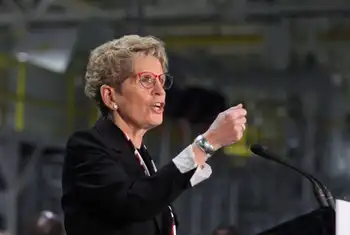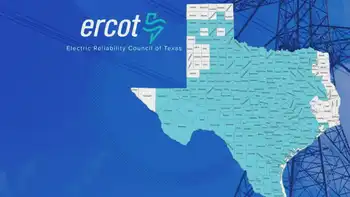Vermont Yankee nuclear battle continues
MONTPELIER, VERMONT - Debate over the future of the Vermont Yankee nuclear power plant has developed into a complex game of chicken between executives with Entergy Nuclear Vermont and Democratic leaders of the state Legislature.
Entergy, which has owned the Vernon facility since 2002, says if it does not win approval for its plan to sell Vermont Yankee and five other nuclear power plants to a spin-off company called Enexus, it will likely close the Vermont nuclear plant as scheduled in 2012.
Democratic lawmakers, meanwhile, say if the Enexus spin-off deal — which they believe is to shield the parent company Entergy from responsibility for cleaning up the site — is approved, it will make it difficult for them to vote in 2010 to allow Vermont Yankee to operate for an additional 20 years.
All of which — along with the lack of a new power contract between Vermont Yankee and the state's utilities for power beyond 2012 — leaves the future of the Vernon facility in doubt.
"I think we're in a wait-and-see mode right now," said Rep. Tony Klein, D-East Montpelier, chairman of the House Natural Resources and Energy Committee. "Nothing has changed. We still don't know what the deal is."
Earlier this month, Entergy released what it calls its latest best offer — a deal that would have the utilities purchase a fraction of the energy produced at Vermont Yankee for 6.1 cents per kilowatt hour. The deal takes the complex revenue sharing agreement — a deal made in 2002 that would have Entergy pay the utilities if they began selling power over a certain price — off the table.
The offer comes from Enexus, but details of the offer were made public to the Vermont Department of Public Service on Entergy letterhead. Entergy Nuclear Vermont Vice President Jay Thayer said the two companies are essentially the same right now and that negotiations with the utilities, Central Vermont Public Service and Green Mountain Power, are continuing.
"The negotiations are with Entergy and Enexus," Thayer said, clarifying a point that has confused lawmakers and observers of the debate. "The two companies are the same people right now."
Thayer said he would like to see the Vermont Legislature, whose two chambers are controlled by Democrats, to vote on continued operation. Vermont's Public Service Board has the ultimate authority over that decision in the state, but lawmakers in Vermont must first vote on whether the plant should continue running after 40 years before the PSB makes a decision.
"I'm not sure if I'm optimistic or pessimistic about the possibility of a vote," Thayer said. "But I would love to see one happen next year. There's a lot of information that the Legislature requested about Vermont Yankee before a vote and we've given them what they need."
Public Service Department Commissioner David O'Brien said there are a lot of provisions beneficial to Vermont in Entergy's best price offer, but he added that he believes the year one starting price of 6.1 cents — that number would increase annually based on Vermont Yankee's operating expenses — is too high a starting point to trade in the revenue sharing agreement.
"There's a lot of value in that revenue sharing agreement," O'Brien said.
O'Brien said the Legislature should vote in 2010 even if there is no power purchase contract with the utilities. More than 600 jobs - about one-third of which are Vermonters - and a significant tax resource are at stake, he said.
"There are a lot of people who rely on that plant for employment," O'Brien said. "And we don't want to lose a global company that sells energy into the market."
The Vermont Legislature has no authority over Entergy's plans to sell off its northeastern nuclear fleet - that's a decision that rests with federal authorities and regulators in New York State and Vermont. But the debate - which even has some normally Entergy-supportive lawmakers scratching their heads - has bleed into the debate over Vermont Yankee running for another 20 years with a 2032 end date.
Senate President Pro Tem Peter Shumlin, D-Windham, represents the county where Vermont Yankee is located in and is running for governor next year. He has accused Entergy of wanting to sell the plant to shield itself from liability of the clean-up costs at Vermont Yankee, which are estimated to be hundreds of millions of dollars.
"Have we learned from AIG, from Lehman Brothers and Fairpoint and the rest?" Shumlin said recently on Vermont Public Radio. "Or are we going to continue to let Wall Street make these sweetheart deals for themselves, where they leave us back holding the bag? I'm just not willing to let Vermonters take that risk."
It's not clear when the PSB will rule on Entergy's request, but the company has said if Vermont does not allow it to sell Vermont Yankee to Enexus, it may close the facility in three years.
Thayer said no final decision has been made, but it would make no sense for Vermont Yankee to essentially operate what would be an orphan plant; the parent company's other facilities are mostly regulated utilities in the south.
"I think we would revisit our plan to pursue a 20-year license extension if Vermont Yankee became our phantom plant in New England," Thayer said. "But I don't want to speculate on what what ultimately happen."
Klein, the chairman of the House energy committee, said he's not impressed by Entergy's best offer price or its threat to close Vermont Yankee if the Enexus deal is not approved. Enexus will borrow billions of dollars to finance the deal, Klein pointed out, leaving it a company very vulnerable.
"We're being offered a deal by a company that is so new it doesn't even have its own letterhead yet," Klein said.
Related News

Tesla CEO Elon Musk slams Texas energy agency as unreliable: "not earning that R"
DALLAS - Tesla CEO Elon Musk on Wednesday slammed the Texas agency responsible for a statewide blackout that has left millions of people to fend for themselves in a freezing cold winter storm.
Musk tweeted that Texas’ power grid manager, the Electricity Reliability Council of Texas (ERCOT), is not earning the “R” in the acronym.
Musk moved to Texas from California in December and is building a new Tesla factory in Austin. His critique of the state’s electrical grid operator came after multiple Tesla owners in the state said they had slept in their vehicles to keep warm amid the lingering power…




